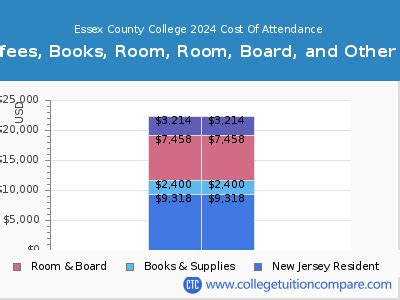Are you considering attending Essex County College (ECC)? Costs are an important factor to consider when selecting a higher education institution. This article provides a comprehensive overview of Essex County College cost, including Tuition, Fees, financial aid, and additional expenses.

Tuition and Fees
Tuition at ECC varies depending on your residency status and the number of credits taken. For the 2022-2023 academic year:
In-County Students:
- Full-time (12 credits or more): $1,770 per semester
- Part-time (11-6 credits): $148 per Credit Hour
Out-of-County Students:
- Full-time (12 credits or more): $2,660 per semester
- Part-time (11-6 credits): $218 per credit hour
Additional fees include:
- Student Activity Fee: $10 per credit hour
- Technology Fee: $39 per semester
- Course Fees: Vary depending on the course
- Graduation Fee: $120
Financial Aid
Essex County College offers a wide range of financial aid options to help students cover the cost of their education. These include:
- Grants: Free money that does not have to be repaid.
- Scholarships: Awards based on merit, need, or other factors.
- Work-Study: Part-time employment opportunities for students to earn money while attending college.
- Loans: Funds that must be repaid after graduation.
Additional Expenses
In addition to tuition, fees, and financial aid, you may also need to factor in the following expenses:
- Books and Supplies: Approximately $500 per semester
- Transportation: Varies depending on location and mode of transportation
- Housing: On-campus housing is not available at ECC. Off-campus housing costs vary depending on location and type of housing.
- Food: Approximately $300 per month
- Personal Expenses: Varies depending on individual needs
Applying for Financial Aid
To be eligible for financial aid, you must complete the Free Application for Federal Student Aid (FAFSA) at fafsa.gov. The FAFSA determines your eligibility for federal and state grants, scholarships, and loans.
Payment Options
Essex County College offers a variety of payment options, including:
- Monthly payment plans
- Credit cards
- e-Check
- Cash
Cost Comparison
Compared to other colleges and universities in New Jersey, Essex County College is an affordable option. According to the New Jersey Higher Education Student Assistance Authority (HESAA), the average annual cost of attendance at four-year public colleges and universities in New Jersey is $25,320. In contrast, the average annual cost of attendance at ECC is approximately $10,000 for full-time students.
Conclusion
The cost of attending Essex County College is manageable and comparable to other higher education institutions in New Jersey. With a variety of financial aid options available, ECC provides opportunities for students from all backgrounds to pursue their educational goals. By carefully considering the costs and planning accordingly, you can make your higher education dreams a reality.
Frequently Asked Questions (FAQs)
Q: What is the cost of attending Essex County College for out-of-state students?
A: Tuition for out-of-state students is $2,660 per semester for full-time students and $218 per credit hour for part-time students.
Q: What types of financial aid are available for Essex County College students?
A: Essex County College offers grants, scholarships, work-study programs, and loans.
Q: How do I apply for financial aid?
A: You can apply for financial aid by completing the Free Application for Federal Student Aid (FAFSA) at fafsa.gov.
Q: What is the average cost of books and supplies for Essex County College students?
A: The average cost of books and supplies is approximately $500 per semester.
Q: Can I receive financial aid if I am part-time student?
A: Yes, part-time students are eligible to receive financial aid, but the amount of aid may be reduced.
